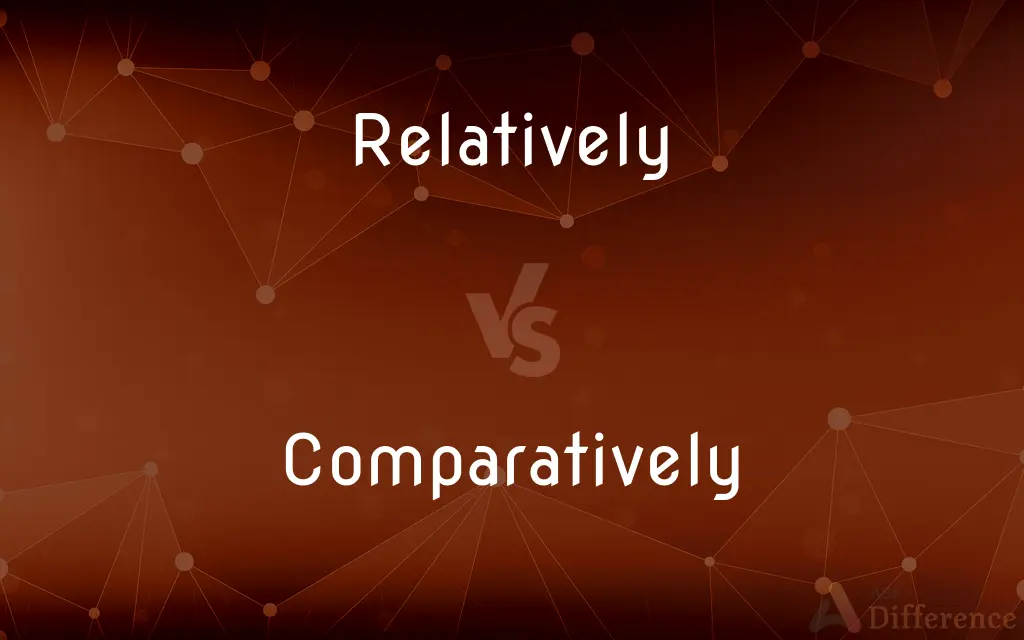Relatively vs. Comparatively — What's the Difference?
Edited by Tayyaba Rehman — By Fiza Rafique — Updated on September 25, 2023
Relatively indicates something in proportion or relation to another thing. Comparatively implies measuring or evaluating two or more things against each other.

Difference Between Relatively and Comparatively
Table of Contents
ADVERTISEMENT
Key Differences
Relatively is an adverb used to suggest that something is true or exists to a certain degree, especially in relation to other factors or things. It points towards a certain condition or characteristic within its own context. Comparatively, however, is also an adverb that involves the act of comparing one thing with another, usually to show differences or similarities.
Relatively stands on its own, suggesting that something is somewhat, kind of, or not entirely the case. It gives a sense of perspective but within a contained framework. Comparatively, in contrast, often requires a point of reference outside of its immediate context, directly inviting a comparison with another subject.
When you use the word Relatively, you're focusing on an inherent quality or state of a subject, understanding it within its own parameters. For instance, if a task is described as "relatively easy," it means it's easy compared to other tasks of its kind. Comparatively would look beyond its immediate realm. Saying a task is "comparatively easy" implies it's easier than another specific task or tasks in general.
To sum it up, Relatively speaks to the internal landscape, emphasizing a condition or state within its inherent bounds. Comparatively reaches outwards, drawing comparisons between two distinct entities or scenarios.
Comparison Chart
Meaning
In proportion or relation to something.
Evaluating by comparison to something else.
ADVERTISEMENT
Reference Point
Internal; within its own context.
External; in relation to another subject.
Usage
To suggest a degree of something.
To show differences or similarities.
Focus
On the inherent qualities or state of a subject.
On the differences between two subjects.
Examples
"He is relatively tall."
"He is tall, comparatively speaking."
Compare with Definitions
Relatively
In relation or proportion to something else.
The task is relatively simple.
Comparatively
In comparison with something else.
It's a comparatively rare occurrence.
Relatively
To a certain degree, especially when compared with other things.
The procedure is relatively painless.
Comparatively
In relation to a point of contrast.
She performed the task comparatively quickly.
Relatively
Compared to similar things or in relation to a standard.
The cost is relatively high.
Comparatively
To a moderate degree when measured against something else.
The material is comparatively lightweight.
Relatively
Indicating that something is true to some degree.
It's relatively common for such symptoms to appear.
Comparatively
By way of comparing with another.
This method is comparatively better.
Relatively
With consideration of all factors involved.
The project is relatively important.
Comparatively
Relating to, based on, or involving comparison.
Relatively
In relation, comparison, or proportion to something else
They were very poor, but, relatively speaking, they had been lucky
Comparatively
Of or relating to the scientific or historical comparison of different phenomena, institutions, or objects, such as languages, legal systems, or anatomical structures, in an effort to understand their origins or relationships.
Relatively
In a relative manner; in comparison with something else
A relatively minor problem.
Comparatively
Estimated by comparison; relative
A comparative newcomer.
Relatively
Proportionally, in relation to some larger scale thing.
He measured his success relatively, that is, competitively.
Comparatively
(Grammar) Of, relating to, or being the intermediate degree of comparison of adjectives, as better, sweeter, or more wonderful, or adverbs, as more softly.
Relatively
Somewhat.
He was relatively successful.
Comparatively
The comparative degree.
Relatively
In a relative manner; in relation or respect to something else; not absolutely.
Consider the absolute affections of any being as it is in itself, before you consider it relatively.
Comparatively
An adjective or adverb expressing the comparative degree.
Relatively
In a relative manner; by comparison to something else;
The situation is relatively calm now
Comparatively
In a comparative manner.
Comparatively
When compared to other entities.
Comparatively
According to estimate made by comparison; relatively; not positively or absolutely.
With but comparatively few exceptions.
Comparatively
In a relative manner; by comparison to something else;
The situation is relatively calm now
Comparatively
Used to make a comparison with another subject.
The city is comparatively small.
Common Curiosities
Can Relatively stand alone in a statement?
Yes, you can say something is "relatively small" without specifying compared to what.
Is "He's tall, comparatively speaking" a correct use?
Yes, it suggests he's tall compared to a specific group or general average.
Can Relatively and Comparatively be used interchangeably?
Not always. Context matters, as the two words have different nuances.
Do Relatively and Comparatively mean the same thing?
No, while both imply some form of comparison, Relatively is about internal context, and Comparatively requires an external reference.
Can I use Comparatively without specifying what I'm comparing to?
Typically, Comparatively implies a direct or understood point of reference, while Relatively does not.
Why use Relatively in a sentence?
It provides a perspective or degree to a statement without specifying an exact comparison.
When should I use Relatively over Comparatively?
Use Relatively when discussing a quality in its own context, and Comparatively when making a direct comparison.
What's a synonym for Comparatively?
"Relative to" can work in some contexts but isn't a direct synonym.
Does Relatively always imply a lesser degree?
No, it simply suggests something is true to a certain extent within its context.
Can you give an example combining both words?
"Relatively speaking, this car is efficient, but it's comparatively less efficient than newer models."
Is it correct to say "comparatively larger"?
Yes, it implies it's larger when compared to another specified or understood subject.
Is Relatively more subjective than Comparatively?
Relatively can be more subjective as it doesn't always specify a point of comparison, unlike Comparatively.
Why might one use Comparatively in writing?
It provides clarity when drawing contrasts between two subjects.
What's the main distinction between the two?
Relatively focuses on inherent qualities, while Comparatively requires an external point of reference.
Are there any pitfalls to avoid with these adverbs?
Ensure that the context is clear, especially with Comparatively, so readers know what the comparison is to.
Share Your Discovery

Previous Comparison
Ardent vs. Vehement
Next Comparison
Elixir vs. MixturesAuthor Spotlight
Written by
Fiza RafiqueFiza Rafique is a skilled content writer at AskDifference.com, where she meticulously refines and enhances written pieces. Drawing from her vast editorial expertise, Fiza ensures clarity, accuracy, and precision in every article. Passionate about language, she continually seeks to elevate the quality of content for readers worldwide.
Edited by
Tayyaba RehmanTayyaba Rehman is a distinguished writer, currently serving as a primary contributor to askdifference.com. As a researcher in semantics and etymology, Tayyaba's passion for the complexity of languages and their distinctions has found a perfect home on the platform. Tayyaba delves into the intricacies of language, distinguishing between commonly confused words and phrases, thereby providing clarity for readers worldwide.















































